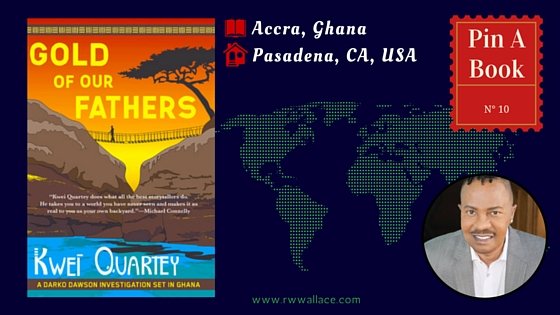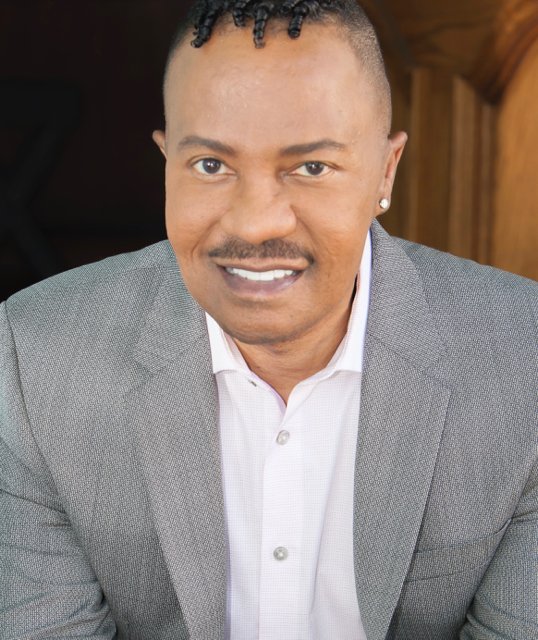
This week, I’m pinning my first book in Africa to my map! Kwei Quartey takes us to Ghana with his book, Gold of Our Fathers 🙂
How did the setting of your story impact your writing?
 Because my setting is the West African country of Ghana, I have to “talk like a Ghanaian.” Dialogue must match the speech of the indigenous people. This isn’t easy in the sense that I can’t get too parochial, because certain Ghanaian figures of speech are so unfamiliar to Americans that my readers would be lost. For example, in Ghana, one might say, “You at all, why?” Which means, “What the heck is wrong with you?” I would avoid using the Ghanaian version unless a translation followed. For instance, “dumsor, dumsor” is an idiom from the Twi, one of Ghana’s main languages (not dialects), meaning “on-off, on-off,” to describe the frequent power cuts that plague the country.
Because my setting is the West African country of Ghana, I have to “talk like a Ghanaian.” Dialogue must match the speech of the indigenous people. This isn’t easy in the sense that I can’t get too parochial, because certain Ghanaian figures of speech are so unfamiliar to Americans that my readers would be lost. For example, in Ghana, one might say, “You at all, why?” Which means, “What the heck is wrong with you?” I would avoid using the Ghanaian version unless a translation followed. For instance, “dumsor, dumsor” is an idiom from the Twi, one of Ghana’s main languages (not dialects), meaning “on-off, on-off,” to describe the frequent power cuts that plague the country.
Above all, what the setting of my stories affords me is the opportunity to give a sense of place to the reader and transport him or her. I love doing this.
How or why is the setting important to who your character is?
Darko Dawson is Ghanaian, no two ways about it. He understands most of his people, but those he doesn’t are often the key to solving of the mystery. In Wife Of The Gods, Darko must worm his way into the psyche of villagers with superstitions and customs he doesn’t know about or comprehend. On the other hand, in Gold Of Our Fathers, Darko struggles to grasp what’s going on in the minds of illegal Chinese immigrants flocking to Ghana for its rich gold reserves. In every Inspector Darko Dawson novel, the setting is connected to a social theme, e.g. out-of-school urban youths in Children Of The Street, indigenous poor disenfranchised by the oil industry in Murder At Cape Three Points, and Darko has to learn quickly about each one to catch the killer.
Which location did you enjoy writing the most in your story? Why this one?
I most enjoyed writing about the lush landscape of Ghana’s Ashanti Region, which has been ruined and depleted in many places by over-logging and illegal gold mining—the topic of Gold Of Our Fathers, in which a Chinese illegal immigrant minor is murdered in a grisly fashion.
When you visited France, which location did you prefer? Why?
Since I only visited Paris, the choice must be Paris! It’s a grand city, yet it feels compact. I loved traveling the Metro. Architecture is lovely. Food in restaurants was always served hot and fast. Importantly, Paris was where the idea for Inspector Darko Dawson was born. In my hotel in 2000, I watched a French documentary about a brutal rural detective in Côte d’Ivoire who used the threat of witchcraft to make suspects and witnesses confess. I was riveted. That’s when I decided to create a detective like that, but in Ghana where I had grown up. Obviously Inspector Darko’s character underwent much fine-tuning before he made his debut in Wife Of The Gods.
What gave you the greatest cultural shock when in France?
People sometimes treated me with hostility when I spoke French and they thought I was a French African. However I was treated well if I spoke English and they realized I was African American.
What do you think would be the greatest cultural shock for a Frenchman who visited your home town? Or the location of your story?
A French person, like others from the West, will find that getting things done in Ghana—any town—is more difficult than in France, and often involves paying a little money here and there (giving a “dash,” as it’s called.) There’s a lot of, “He/she is not here,” and “Come back tomorrow,” which ends up in a colossal waste of time in gridlocked traffic. When people say they are “on the way coming” to meeting point you, they may not even have left home. Also, the expression, “it’s not far,” while giving you directions, should not be taken at face value. Time and distance are not thought of in the same way as in the West.
Please note that Amazon links are affiliate links. You’ll pay the same price for anything you order, but I will earn a small commission.
